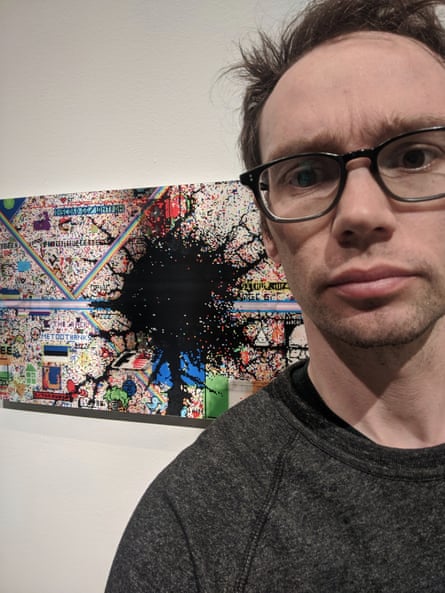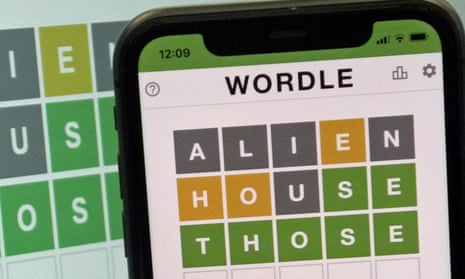It started as a token of love, then went viral, and now it’s making people angry. If you noticed that “token”, “viral” and “angry” are all five-letter words, then the chances are you’re a devotee of Wordle, the online word puzzle that has become an internet craze.
For those who have just returned from walking across the Sahel, Wordle is a game in which you have to guess, or work out, a five-letter word. Each day there is a new word. You can have six attempts, and each correct letter selected is awarded a yellow square. If it’s also in the correct place, it’s a green square. All other letters get a grey square.
Even if you don’t play the game, it’s hard to avoid its cultural imprint, as participants have taken to posting their results on social media – ubiquitous grids of grey, yellow and green squares, signifying a player’s line score.
Brooklyn-based Welsh software engineer Josh Wardle – the puzzle is a play on his name – developed the game to entertain his partner during lockdown. Since he put it online back in October, it has drawn millions of users. Last month Wardle sold the puzzle to the New York Times for a sum said to be “in the low seven figures”.

But all is not joy and happiness in the world of Wordle. Although the NYT, which mostly operates behind a paywall, has said the game will “initially remain free”, there is an expectation that advertisements or promotions may soon be added.
For British players there has also been the issue of cultural imperialism, otherwise known as American spelling. There was a collective loss of a sense of humour recently when “humor” was the solution, just as Brits had earlier felt disfavoured when “favor” appeared.
Then it emerged that the newspaper was removing words from the approved dictionary – you have to enter a recognised word on each line – that were deemed offensive, including “slave”, “lynch” and “wench”. The move was seen by some as a cryptically puritanical form of virtue signalling.
After the NYT committed to cull “obscure” words, there were also fears voiced that it would make the game easier, followed shortly afterwards by the anxious concern that it would be made more difficult.
Last week opinion swung towards the latter scenario when the new owners did not baulk (or “balk”, to use the spelling favoured by many purists) at using “caulk”, a five-letter word that inspired many players to utter four-letter words. Some took to social media to denounce the noun – it’s a kind of waterproof sealant – as something that only Bob the Builder would know.
According to clinical psychologist Dr Patapia Tzotzoli, the appeal of Wordle is that it conforms to the theory of self-determination.
“The theory suggests we can become self-determined when our three innate psychological needs – autonomy, competence and connection – are met,” she says. “Wordle enables autonomy because we choose to take a few minutes out of our day to play it. It offers competence because we can solve a puzzle and fare better than others. And in terms of connection, it fosters a sense of belonging to a wider community. It hits all the right notes to activate our motivation to keep going back.”
But the more popular it becomes, the more complaints it provokes. The agitated talk of caulk followed immediately after the doubling-up crisis of the previous day. One of the appeals of Wordle is that everyone tackles the same word, at least within the English-speaking world – there are now versions in more than 90 languages. Players know that when they are struggling to get “knoll” or “siege” it’s a specific struggle shared with millions of others. This is the “connection”.
But last week there was a sudden disconnect. Instead of a single answer, there were two: aroma and agora, depending on whether or not you were using the old or new URL. The NYT decided to drop agora because it was too arcane (excuse me, caulk?) and replace it with aroma, but some unrefreshed browsers got the original choice instead.
Cue outrage of the kind more normally associated with gross infractions of the moral code, like flashing the Queen or swearing at David Attenborough. The judgment doing the rounds on Twitter was “scandal”. And many players felt that the one-word-a-day contract had been irrevocably broken.
Things came to a head last week with a deceptively simple word: shake. That was exactly what many users were left doing with their heads. To complete the puzzle in four guesses seems to be the par score for Wordle. Doing it in three is a jolt of satisfaction, in two is smugly pleasurable, and in one is pure luck. But failing to do it within the allotted six is a wretched study in self-recrimination.
That was the result for large numbers of players when they were lured into writing “shame”, “shape”, “shave”, “shade”, “shale” or “share”, but not “shake”. Disillusioned – or perhaps simply defeated – players began to announce that they were off to Quordle, a more taxing version of the game which involves completing four grids simultaneously.
For the time being, however, the discontents are unlikely to dent the phenomenon that is Wordle. The question is whether, as we return to a more outgoing way of life, a game that was born under social restrictions will continue to flourish.
“It’s in the nature of things to be impermanent,” says Tzotzoli, “and that’s true for people’s desires. We join a trend and then we move on to something else that is new and more exciting.”
No doubt that’s the case, but just at this moment it’s difficult to imagine anything more exciting than five squares turning green – the most satisfying five-letter word of all.
